Guest feature | Transmetrics and Dirk Reich on Logistics Industry and Entrepreneurship
On the Transmetrics blog we want to engage opinion leaders from the logistics industry into the discussion about important aspects and trends in the industry. Our first attempt at doing so is this interview with one of the industry champions – Dirk Reich, that I had a pleasure of conducting. Dirk Reich is an active board member of Panalpina, Inc. and LSG Group, a member of Advisory Board of Transmetrics, a former CEO of Cargolux Airlines and a former management board member of Kuehne + Nagel. He has already founded two successful companies: R+R International Aviation which offers strategic advice in the fields of e-commerce and logistics in China and Log-Hub which is a marketplace platform for sharing warehouse capacity.
In this interview, Dirk shared his views on the different challenges of various transport modes, the potential of predictive analytics to resolve inefficiencies in the industry, and his wisdom on many other interesting topics.
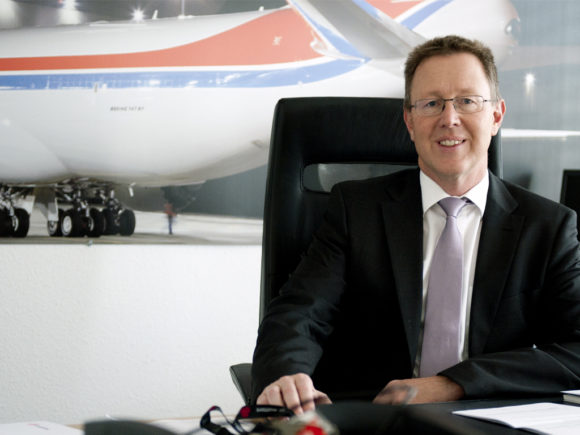
Anna Shaposhnikova (A. S.): Greetings Dirk. Welcome, it is a pleasure to talk to you today. I know that you are passionate about your work and have a wide range of interests from piloting your own plane to traveling to exotic places and even hunting scorpions in the desert. When and how did you decide to choose this career path in the logistics industry?
Dirk Reich (D. R.): It started very early. My passion to be a pilot, flying and traveling the world led me to join Lufthansa at a young age. Within Lufthansa, you have the passenger side of the business and the freight side and it became clear to me within my first six months on the job that the freight side of the business was far more interesting than the passenger side. Cargo doesn’t talk and cargo doesn’t walk. It’s more diverse and it’s very complex. So you need to decide yourself on how to bring it through customs, how to handle it throughout the whole supply chain. That is why the whole global supply chain was a lot more interesting to me than handling passengers and that’s why very early on when I was just 18, I started my apprenticeship at Lufthansa in the cargo logistics division as opposed to passenger logistics.
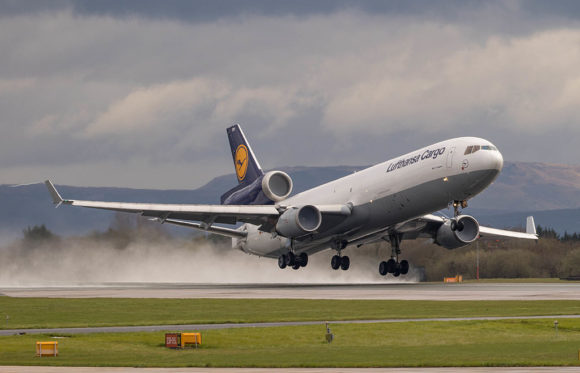
Picture Credit: Russell Lee
“Cargo doesn’t talk and cargo doesn’t walk. It’s more diverse and it’s very complex.”
A. S. You worked for both types of companies: assets providers like Lufthansa or Cargolux and for a logistics company like Kuehne + Nagel. What are the main differences between these 2 types of companies and what are the challenges?
D. R. The main difference is the closeness to the final customer. Asset providers towards the end of the supply chain like Lufthansa Cargo have less final customer contact. And if you go to a solution provider like Kuehne + Nagel or Panalpina which cares a lot more about IT, sales and is more customer service oriented, it has a lot of direct contact with shippers and buys services from asset providers. Such companies are much closer to the final customers which makes them focus more on the customer needs rather than on just capacity provision and pricing.
Another big difference between an asset provider and a logistics company is that the latter offers air, sea, land, warehousing and an end-to-end service, and the asset provider offers usually just a specific mode of transportation – air freight, ground freight or sea freight. So their scope is a lot more limited and the price war is much fiercer. They have a lot of fixed costs tied up in their assets. Whilst a logistics provider focuses more on trying to find the best solution for the customer and then buying it on attractive terms from those who have the assets. Those are the key differences.
A. S. Very interesting. What then are the key differences between land transport and air freight?
D. R. The customer base of land transportation (by which I mean big trucking companies or big integrators with a lot of assets) is more diverse because customers of all sizes use land transport at some point, whereas only bigger, international companies use air or sea freight. There are thousands of land transport companies whereas there are far fewer airfreight and shipping lines. And since everyone uses land one way or another – the competition is also a lot more diverse, with different sub-segments by industry, group or by speed.
A. S. Yes, that’s why at Transmetrics land transport is our primary focus. It is not only more diverse but also much bigger than any other sector, especially if you look at Europe.
D. R. Yes but don’t forget about the Asian market. I think its size is even higher there if you look at it in volume, in tons. It just doesn’t count that much in revenue terms because the Chinese national currency doesn’t translate well into dollars, and therefore in value terms, it seems a lot lower. In terms of tons and mass of transportation, I think the Asian market has caught up with the US market and the European market.
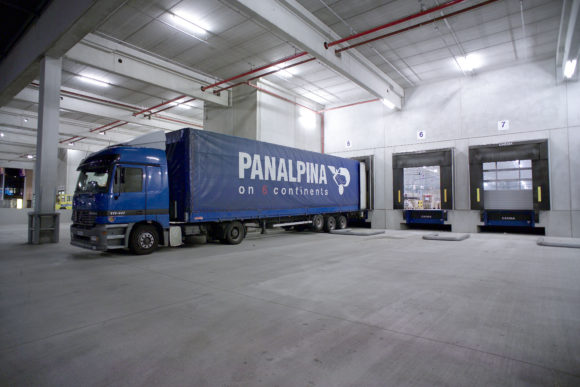
Picture Credit: Panalpina/ZVG
A. S. Interesting! So far, you’ve worked in two different modes of transport – land and air, and you’ve worked as a service provider and as an asset provider. What are your plans for Panalpina? Will you be involved to some extent in the maritime side of their business?
D. R. I’m not planning to be involved with any division in particular because I’m not part of the Management Board. My tasks there are more of a strategic, audit and risk control nature but do not include day-to-day involvement in the business. As part of my responsibility, as a member of the Board of Directors, there is a variety of strategic projects going on in all regions and products that are being followed. Due to my background in airfreight and contract logistics, I can add more value in those fields than in the ocean freight business. Speaking of contract logistics – warehousing and distribution are a huge part of it. So, perhaps, Transmetrics also has the potential to start optimizing the warehouse flows, even if that’s still far away from your current business model, but I guess you can apply the same concepts there.
A. S. It is not that far away. In fact, we have already been in discussion about a project for warehouse optimization with one of the biggest Belgian companies specialized in shipping to the UK. We had a chance to visit their warehouse. It’s really another world, as complex if not more so, as handling cargo flows on the line haul network. So indeed automation, optimization, improving efficiency – these are really the key. Talking of warehouses, I know that you are involved in a new initiative right now – Log-Hub, could you tell us about it?
D. R. As we all know, e-commerce has infiltrated all sectors. So we said: let’s take the concept of Airbnb – renting out empty space and apply it to warehouse operations. Logistics providers with idle warehouse space can offer it through our platform, much like you would do with an idle room in your apartment. Log-Hub makes them visible worldwide so that they can be accessed through the internet. Our vision is to have a combination of what Airbnb and Amazon do today and to do it better. We currently have 590 participating warehouses in 40 countries, but we still need to grow a lot to get the product to the level of Airbnb and Amazon, but that’s our vision and we shall have it live shortly.
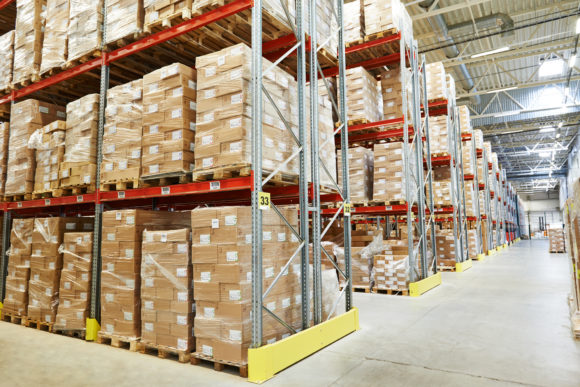
“Let’s take the concept of Airbnb – renting out empty space and apply it to warehouse operations. Logistics providers with idle warehouse space can offer it through our platform, much like you would do with an idle room in your apartment.”
A. S. It is indeed a very interesting concept. Especially as you are the only company of this kind in Europe, there are no others like you. I am sure it will be very successful. So, Dirk, we can see that, besides having an extended experience of working for big corporations you are also very entrepreneurial. You are a founder of Log-Hub, which we have just been talking about and also of R+R International Aviation. And you are also on the advisory board of Transmetrics. What interested you in joining Transmetrics as an advisor?
D. R. Two things: the team and the technology: T&T. The team is very passionate and very smart and they work with extraordinary speed and that’s what’s so fascinating about Transmetrics. About the technology: I think it’s all about big data and making use of it. The potential is well beyond any existing services. It is quite unique to see a passionate team that is 150 percent convinced of bringing machine learning and big data analysis into the logistics market – this is why I’m happy to be part of it and to bring my grey-haired wisdom so we can have a win-win relationship where everybody learns from each other and becomes successful.
“The team is very passionate and very smart and they work with extraordinary speed and that’s what’s so fascinating about Transmetrics. About the technology: I think it’s all about big data and making use of it. The potential is well beyond any existing services.”
A. S. It is for sure win-win, we are really happy and grateful to have you on the board. According to the latest statistics from the World Economic Forum report in 2016, over the next decade, approximately $520 billion can be saved in operating costs by analytics globally. Would you agree with this number?
D. R. I am absolutely convinced that this number is realistic or even an understatement. The need is really there from an economic perspective and from an environmental perspective. We will see more pressure on the market from the environmental side as traffic further doubles, as it has over the last 10 years.
A. S. That’s good to know because that’s what we believe in as well and it’s nice that industry experts like you also agree on this. As a final note of our interview, Dirk, I know you are passionate about flying your own plane. I am sure you have a lot of interesting adventure stories to tell. Could you please share one with our readers?
D. R. That is a tough one, but a very recent story happened when flying myself around South Africa and Namibia, I landed in the middle of the Namib desert to eat some German cake. Since Namibia was once a German territory many years back, they still have a lot of German traditions including German bakeries and German breweries there. There is a gas station, a lodge and a little German bakery at Solitaire in the middle of the Namib desert. And since I couldn’t resist the temptation of having a slice of German Apfelkuchen, which I can’t even find here in Switzerland, I decided to land in the Namib desert to have a piece of traditional German Apfelkuchen. It was just a tiny sand strip, but the Apfelkuchen was well worth the adrenalin of a remote desert landing.
“I decided to land in the Namib desert to have a piece of traditional German Apfelkuchen. It was just a tiny sand strip, but the Apfelkuchen was well worth the adrenalin of a remote desert landing.”
A. S. That sounds very typical of you, going all the way to the Namib desert for a great slice of apple cake rather than taking the easy route, for example, to Munich, which is far closer. This brings us to the end of our interview. Just to conclude, could you share any parting wisdom about logistics strategy with our blog readers?
D. R. Look at the stars, keep your feet on the ground and don’t trip too often! What I mean by this is: forget day-to-day problems and always look out for new ideas. Stay grounded, making sure you don’t trip and fall too often, this applies to Transmetrics, Log-Hub and all other startups.


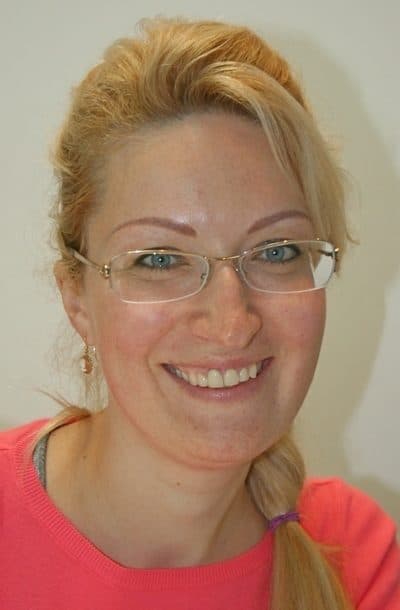



Comments